WASHINGTON, D.C. — Middle Tennessee State University officials were invited Tuesday to the White House as part of a panel of education leaders who shared plans to reopen the nation’s schools and universities this fall while combatting COVID-19 concerns.
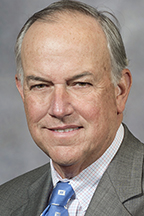
Stephen B. Smith
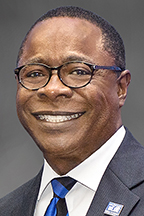
Dr. Sidney A. McPhee
Board of Trustees Chairman Stephen B. Smith, President Sidney A. McPhee and newly appointed Student Trustee Delanie McDonald were among educators and advocates from across the country joining President Donald Trump and Vice President Mike Pence at the event.
“I was impressed that three cabinet secretaries, in addition to the president and vice president, took a big portion of their day to share their thoughts and hear our concerns,” Smith said. “It was a great honor for MTSU to be included in that kind of company.”
McDonald and McPhee delivered remarks at the final session of the daylong panel, organized by Pence in his role as chairman of the White House Coronavirus Task Force. First lady Melania Trump and Karen Pence, wife of the vice president, also took part in the discussions.
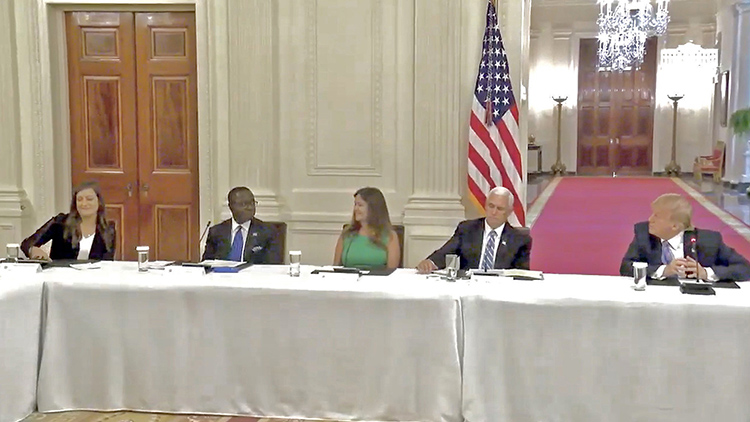
A screenshot from a video showing MTSU Student Trustee Delanie McDonald, left, as she prepares to speak at a White House panel Tuesday on plans to reopen the nation’s schools and universities this fall. Joining McDonald, from left, was MTSU President Sidney A. McPhee, second lady Karen Pence, Vice President Mike Pence and President Donald Trump.
“I was heavily involved on campus, so I know the extreme importance that the campus environment has on student success,” McDonald told Trump, referencing her role as student body president. “My fellow students across the nation have lost a lot this year and it is important to all of us to safely return to campus this fall.”
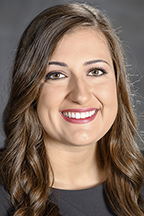
Delanie McDonald
McDonald, a Buchanan Scholar, said MTSU “has done an exceptional job of updating students, reassuring them that they are working tirelessly for our safe return to campus.”
McPhee spoke about MTSU’s work in attracting high-ability students like McDonald and setting new high marks in average ACT scores, while also helping first-generation and low-income students reach their higher education goals.
“We stepped up,” McPhee told Trump on MTSU’s response to COVID-19. “We were the very first university in Tennessee that said we were going to reopen for the fall (for) in-person classes.

President Donald Trump
“But in reality, Mr. President, we never closed,” he added. “Because of the nature of our student population, many of our students had nowhere to go in March when a lot of schools closed down.
“We kept our residence halls open, we kept our cafeteria and provided the same services, obviously taking in consideration the virus. And so we feel we have the experience of actually operating the university in a pandemic.”
McPhee told the panel that MTSU has invested $3.5 million in video and audio upgrades to capture class meetings electronically — and another $3.4 million was spent to buy faculty laptops, online exam proctoring and other software needs. Much of those funds, McPhee said, came from the federal coronavirus relief directed to universities.
While cautioning that the unpredictable nature of the coronavirus makes any guarantees difficult, McPhee referenced the work by a recent task force that developed MTSU’s plans to open while making the health and safety of the campus community its top priority.
“We believe that it is in the best interest of our students to open up, to provide that top-quality education,” he said.
— Andrew Oppmann (Andrew.Oppmann@mtsu.edu)
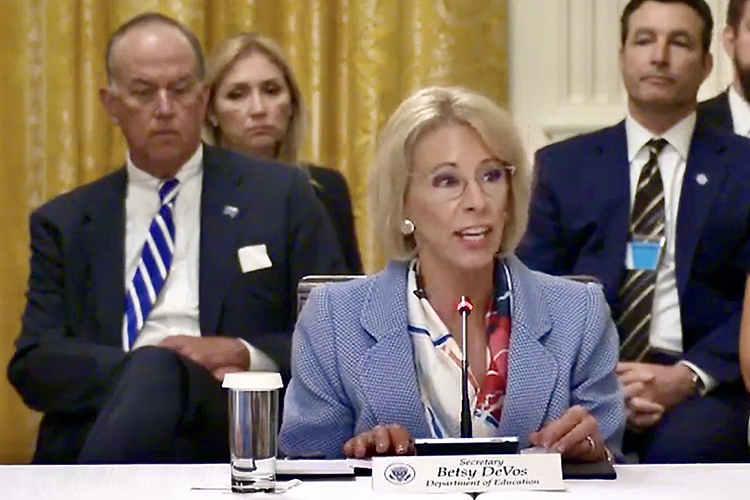
A screenshot from a video showing MTSU Board of Trustees Chairman Stephen B. Smith, back left, watching Education Secretary Betsy DeVos speak at a White House panel Tuesday on plans to reopen the nation’s schools and universities this fall.

COMMENTS ARE OFF THIS POST